Your home is just that – Your Home. It’s not just about being the largest financial investment that you’ll possibly make. It’s the place where memories are made, where family and friends come together and where you find shelter. You’ll need someone who respects this and treats every inspection as if it was our own home. We have the highest level of experience in this field and service an extensive list of happy clients who enjoy our personalised services.
Crunch Pest Control conduct our timber pest inspections in accordance with Australian Standards AS 3660.1:2017 and AS 4349.3-2010. The inspection is for timber pests which specifically include subterranean and dampwood termites, borers of seasoned timber, wood decay and fungi. During the inspection we will assess the evidence of timber pests, level of damage, conditions that favour timber pests, remedial and protective measures required and any further investigations that may be necessary.
What Are Termites…
Termites are primitive insects belonging to the order Isoptera. They live in colonies, which have a social organisation similar to that of ants, some bees and some wasps. A colony consists of several castes, which are physically different from each other and have different tasks to perform. All of the individuals are directed towards the maintenance and survival of the colony.
What We Inspect…
Crunch Pest Control use the latest in termite detection technology including FLIR E5-XT Thermal Imaging Cameras, Termatrac T3i, Tramex ME5 Moisture Encounter and Termite sounding techniques. The areas inspected include the interior of the building, the exterior of the building, the roof space, the subfloor space and the site (including trees, stumps and timbers embedded in the soil) within 30m of the building and within the property boundary.
How Much…
We compete in service rather than price and we take no shortcuts in any aspect of our practice. The cost of this service varies dependant on the size of the structure to be inspected. Contact our office for pricing.
What We Look For
We will conduct our examination of the building and assess and report on the evidence of the presence of timber pests identifying the common name, genus and species of the timber pests, the location of activity or damage and a general description of the severity of damage, the evidence of inactive timber pests, the evidence of treatment for timber pests, conducive conditions to timber pests and location of any subterranean termite nests found within the property boundaries up to 30 metres.
We are also looking for and will report on subfloor ventilation issues, subfloor drainage issues, influence of vegetation adjacent to the building, damp areas conducive to timber pests, storage of timber underneath and adjacent to the premises, timber in contact with the soil and the building, and any bridging of physical barriers or slab edges. A comprehensive report will be emailed to you on the day of the inspection.
Ready to make a booking? Call 1300 860 439 today!
Make a booking for our Termite Inspections online!
Fill out your details in the form below & our team will be in touch to organise your booking request.
Information about specific termite species can be found below:
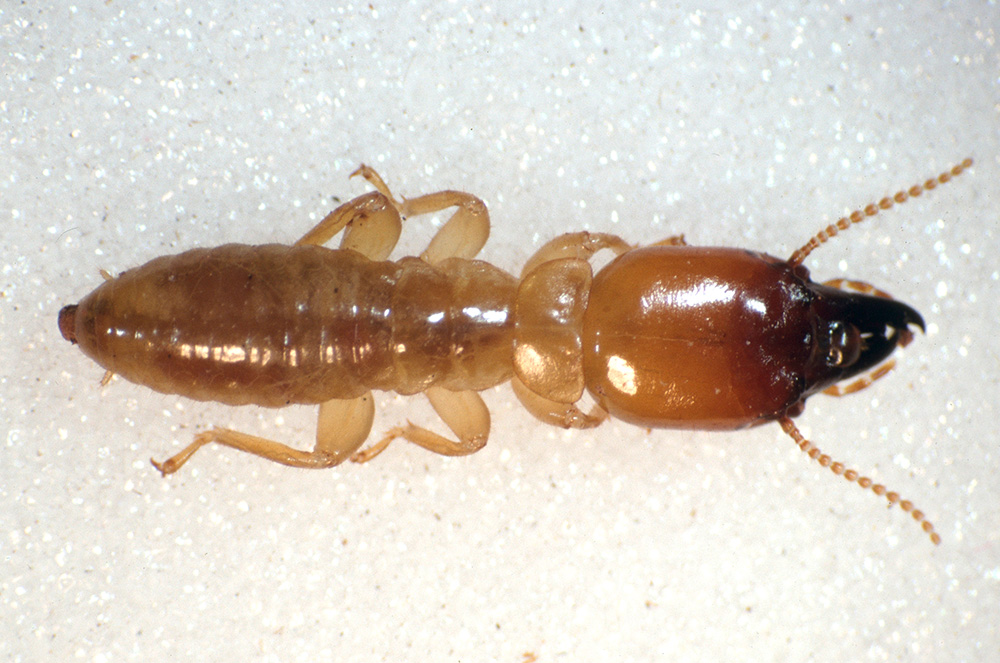
Porotermes Adamsoni
(Dampwood Termite)
Soldier – 12.00 ± 3.00 mm – Mandibulate.
This species is a dampwood termite requiring decayed timber to start a colony. It is mainly a pest of trees in forests, where it attacks the wood, degrading it for various purposes. Only rarely is it found timber in service where its attack is initiated in areas of dampness where there is decayed wood, from which it can move to sound wood.
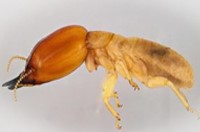
Neotermes Insularis
(Ringant Termite)
Soldier – 12.00 ± 3.00 mm – Mandibulate.
Activity from this termite is mainly in the softer growth rings of timber; and in trees the workings are fairly clean, which distinguishes this species from Porotermes Adamsoni. It is a serious pest of forests on the east coast of Australia. It mainly affects Eucalypt species where its damage to the softer growth rings limits the utilisation of the timber for many purposes.
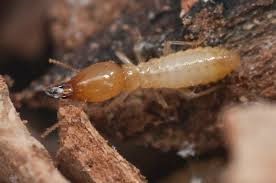
Coptotermes Acinaciformis
This is the most destructive termite species in Australia. It attacks ALL timber structures. Soil contact is preferred for this species, but not essential, provided that it has an assured moisture supply and secure habitat. They mostly nest in trees, stumps, poles, or filled-in verandahs where timber has been buried.
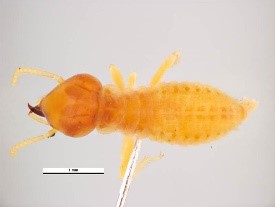
Coptotermes Lacteus
Soldier – 4.40 ± 0.40 mm – Mandibulate.
This species of termite is not considered a pest of buildings and living trees as it prefers dead wood in the ground, such as posts, poles and fallen trees. The wings of the alates are darker than those of Coptotermes Acinaciformis and Coptotermes Frenchi. The various forms of Coptotermes are so similar that it is best left to Crunch Pest Control to identify.
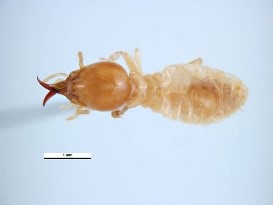
Coptotermes Frenchi
In Melbourne and suburbs of Melbourne this species has caused significant damage to buildings. Coptotermes Frenchi can be notably shier than Coptotermes Acinaciformis, sometimes causing medium amounts of damage to multiple parts of a structure while still causing major overall damage. Their soldier caste is also smaller than those of Coptotermes Acinaciformis.
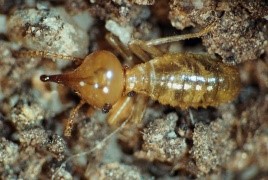
Nasutitermes Fumigatus
These species are of little economic significance, making small colonies in the ground and feeding on decayed wood in fencing and posts. Nasutitermes Fumigatus will attack moist and weathered decking on outside verandahs.
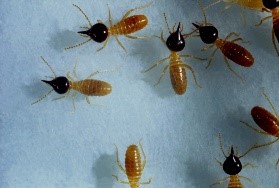
Nasutitermes Exitiosus
Soldier – 4.20 ± 0.60 mm – Nasute.
This species will attack wood in the ground and timber in service (buildings). When they go unnoticed, severe damage occurs. Pine timbers are resistant to this species and where attack is present, hardwood timbers, particularly the sapwood of these is preferred. The soldiers of this species are difficult to identify from other Nasutitermes, therefore it is best left to Crunch Pest Control, however where soldiers are found and they are in the size range, they are most likely Nasutitermes Exitosus.
Ready to make a booking? Call 1300 860 439 today!



